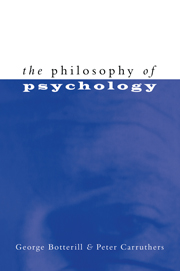Book contents
- Frontmatter
- Contents
- Preface
- Acknowledgements
- 1 Introduction: some background
- 2 Folk-psychological commitments
- 3 Modularity and nativism
- 4 Mind-reading
- 5 Reasoning and irrationality
- 6 Content for psychology
- 7 Content naturalised
- 8 Forms of representation
- 9 Consciousness: the final frontier?
- References
- Index of names
- Index of subjects
6 - Content for psychology
Published online by Cambridge University Press: 05 June 2012
- Frontmatter
- Contents
- Preface
- Acknowledgements
- 1 Introduction: some background
- 2 Folk-psychological commitments
- 3 Modularity and nativism
- 4 Mind-reading
- 5 Reasoning and irrationality
- 6 Content for psychology
- 7 Content naturalised
- 8 Forms of representation
- 9 Consciousness: the final frontier?
- References
- Index of names
- Index of subjects
Summary
In this chapter we review, and contribute to, the intense debate which has raged concerning the appropriate notion of content for psychology (both folk and scientific). Our position is that the case for wide content (that is, content individuated in terms of its relations to worldly objects and properties) in any form of psychology is weak; and that the case for narrow content (that is, content individuated in abstraction from relations to the world) is correspondingly strong. But we also think that for some common-sense purposes a notion of wide content is perfectly appropriate.
Introduction: wide versus narrow
The main reasons why this debate is important have to do with the implications for folk and scientific psychology, and the relations between them. (But it will also turn out, in chapter 9, that the defensibility of narrow content is crucial to the naturalisation of consciousness.) For if, as some suggest, the notion of content employed by folk psychology is wide, whereas the notion which must be employed in scientific psychology is narrow, then there is scope here for conflict. Are we to say that science shows folk psychology to be false? Or can the two co-exist? And what if the very idea of narrow content is incoherent, as some suggest? Can scientific psychology employ a notion of content which is externally individuated? Or would this undermine the very possibility of content-involving psychology?
Some wide-content theorists, such as McDowell (1986, 1994), believe that the debate has profound implications for philosophy generally, particularly for epistemology.
- Type
- Chapter
- Information
- The Philosophy of Psychology , pp. 131 - 160Publisher: Cambridge University PressPrint publication year: 1999



